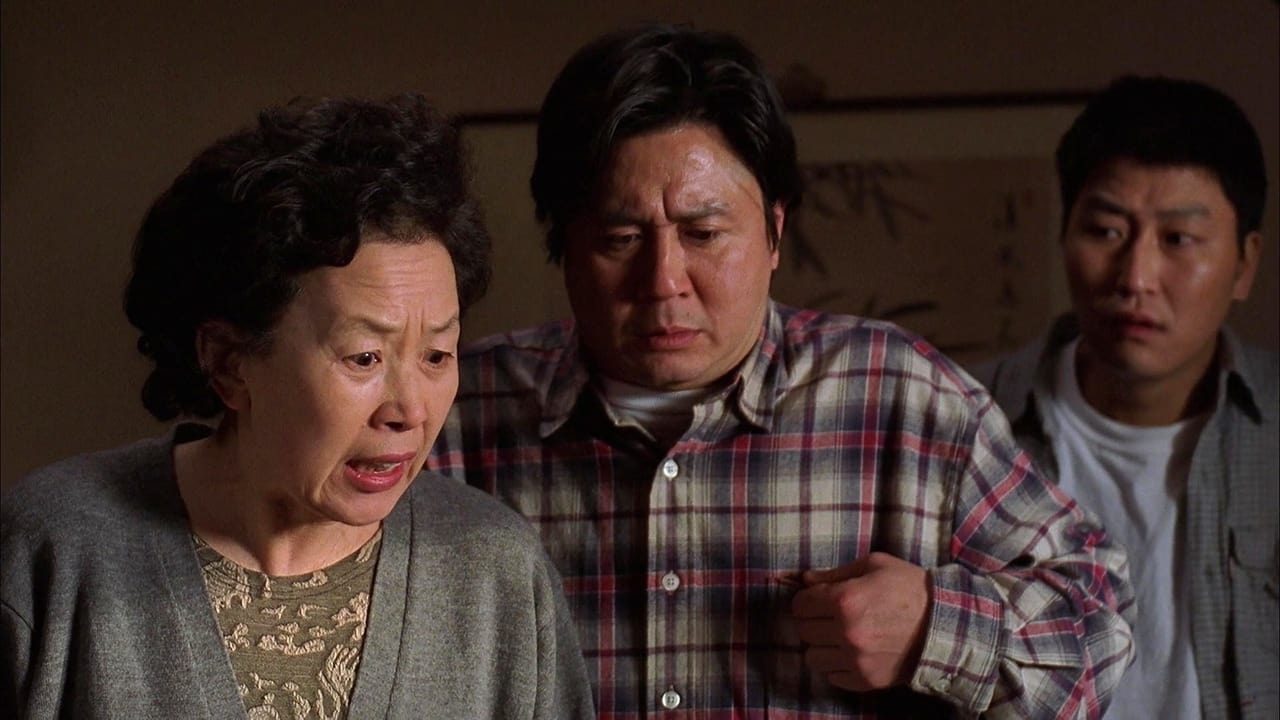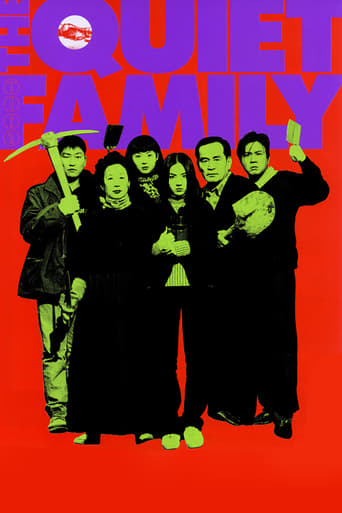

'The Quiet Family's' concept is better known in Miike's remake which is a shame because while the Japanese counterpart is a masterpiece in its own right the original movie needs not be compared; it stands as a pearl of dark comedy. The mood is full of suspense as the Kang family is visited by misfortune upon misfortune. Morbid humor sets the tone of a very tight story and some typical comic tropes are adapted to fit the overall feeling of stress as things get out of control. The cinematography is understated but highly competent with an emphasis on indoor scenes that add to the claustrophobia of the situation.Off beat and tense, the movie's aesthetics are close to the noir genre. It never degenerates into nonsense territory and much of its entertainment value resides on how believable the characters' reactions are. This quiet family systematically makes the wrong choice that of course leads to further complications but the entire insanity is understandable and made more hilarious for that. A grim fatalism pervades everything as if for all their mistakes the Kangs are indeed cursed.On top of the freak deaths, the scrambling for hiding dead bodies, the crossing the line into crime, the movie is true to its title: a portrait of a family that would rather live in peace. Their struggle for keeping their both their livelihood and quiet walks a very thin line as far as morals go but the family unit is so tightly knit that somehow overrides this. The finale brings this home in a simple and effective manner. Cleverly plotted and with solid performances all around, 'The Quiet Family' should be seen by anyone willing to be amused by something different.
... View MoreMaybe this should become my mantra: "The property of 'originality' is based not so much on actual properties of the art object in question as it is based on the knowledge of the person ascribing the property to the art object in question". In other words, when we deem an artwork "original", it doesn't so much mean that the work _is_ original as it means that we're just not familiar with the works that have had a significant influence on it, or we do not remember the precursors (for those of us with less than perfect memories . . . what was I saying?)The Quiet Family has already had a significant influence on films such as Jaume Balagueró's The Darkness (2002), and it has already been remade, by wacky Japanese director Takashi Miike, as The Happiness of the Katakuris (Katakuri-ke no kôfuku, 2001). I didn't realize that Happiness of the Katakuris was a remake of this film until I watched Happiness and looked it up on IMDb. I had never heard of this film before. South Korean films do not exactly get a great amount of publicity in the U.S., unfortunately.Unlike Miike's remake, which is a very good film in its own right, The Quiet Family doesn't have bizarre claymation, it's not a musical, there aren't singing and "dancing" zombie-corpses, and there isn't some karmic disturbance of an equivalent to Mt. Fuji. This is a much quieter and understated film, but it's still a "black" (morbid or macabre) comedy-drama about a horrific, bad situation that just keeps getting worse.The story concerns Tae-gu Kang, who has bought a small hotel (unlike Happiness of the Katakuris' much simpler bed & breakfast) in a relatively remote hiking area. He moves his family--his wife, son, two daughters and his brother--to the hotel, where they wait for guests to arrive. No one shows up. When they eventually do get a guest, it's a strange, solitary, older man who ends up committing suicide with his hotel key chain. The man's wallet, which seemed to contain a substantial sum of cash, is missing. Worried that the authorities will never believe them that it was a suicide, especially given their son's troubled past, and worried that the situation will create bad publicity for their hotel, they decide to bury the body on their property. Other guests begin trickling in, but for some reason or another, they all meet less than favorable fates. Just how much bad luck will the Kangs have, and just how far will they go to surmount it? Even though this is a morbid comedy, director Ji-woon Kim employs very deliberate "art-house drama" pacing and tonalities. The cinematography is interesting throughout, and recurrent motifs include sustained, almost motionless shots of daughter Mi-na Kang (Ho-kyung Go), who is implied as an emotional "center" for the family (and indeed, she's the only one who remains relatively even-keeled throughout the bizarre occurrences). There are also many slow tracking or zoom shots of the beautifully decorated and colored hallways of the hotel (this is one of the conspicuous influences on the film Darkness, which has similar color and decoration schemes).Another "center" for the Kangs is mealtime. We see them eating many times throughout the film--it's a way for them to gather their bearings, if possible, and figure out their "plan of attack". One nicely symbolic scene shows everyone refraining from eating at the table except for Mi-na and her sister Mi-su (Yun-seong Lee), as the family initially keeps the girls in the dark about the macabre goings-on.Kim, who also wrote The Quiet Family in addition to directing, even spoofs the typical art-house drama romance, with a man who courts Mi-su a little too fervently and of course meets a twisted fate. This sets off a chain of events that lead to a very funny climax.The crux of the film is the ever-escalating occurrences and humorous attempts to cover them up. This provides amusing subtexts about how good intentions can lead to severely immoral actions (and the guests even get in on this subtext a bit), but at the same time, we empathize with the protagonists, as the Kangs, at least, may be making bad judgments, but if they don't, they could face worse consequences. This is a quiet family that wants to remain quiet. While I prefer the bizarreness of Happiness of the Katakuris, at least slightly, The Quiet Family is still a very good film, and you just might prefer it if your tastes lean more towards art-house dramas than the surreal and over-the-top.
... View MoreLately, a lot of people have been getting into Korean cinema and enjoying the fact that they have made some absolutely amazing films as recently (Chingoo, JSA, Failan, etc.). However, this film is definitely not one of them. I was sorely disappointed; it did not seem to have the wit and spunk that was injected into Korean film as of late. You can definitely tell that the real foundation for this film is not Korean, but rather ... Koreans copying the Japanese. That is why I would like to pose the question to those involved in the production of this film -- why did you make this mistake? The story, the portrayal, the acting, the cinematography... All of it... Not worthy of watching. A poor job all-around, and poor results only to show for it. The Korean-style that you normally see in Korean cinema is obviously missing, and nothing in the film even begins to make up for it.If you want to see Korean film, and enjoy Korean cinema, this is not the film for you to watch. I would tell all people to happily skip over it -- this is not Korean cinema, this is something else.
... View MoreThe storyline: A Korean family bought a lodging hotel for bargain basement prices in a desolated location. Hotel guests were hard to come by but when the first guest finally arrived, he committed suicide. More guests started to show up... but things did not turn out the way they were hoping... A classic case of be careful what you wish for, because it may actually come true in unexpected ways...Think of this as Korean version of the "Addams Family". This movie is a showcase of dark humor while several parallel subplots are going on. I especially like the acting of the youngest daughter Mi-na, her looks and mannerism epitomize the dark humor of the entire movie.Not the funniest movie to come out from the Korea movie industry in recent years, but nonetheless quite enjoyable for those who like dark humor movies like Beetlejuice or Addams Family.
... View More